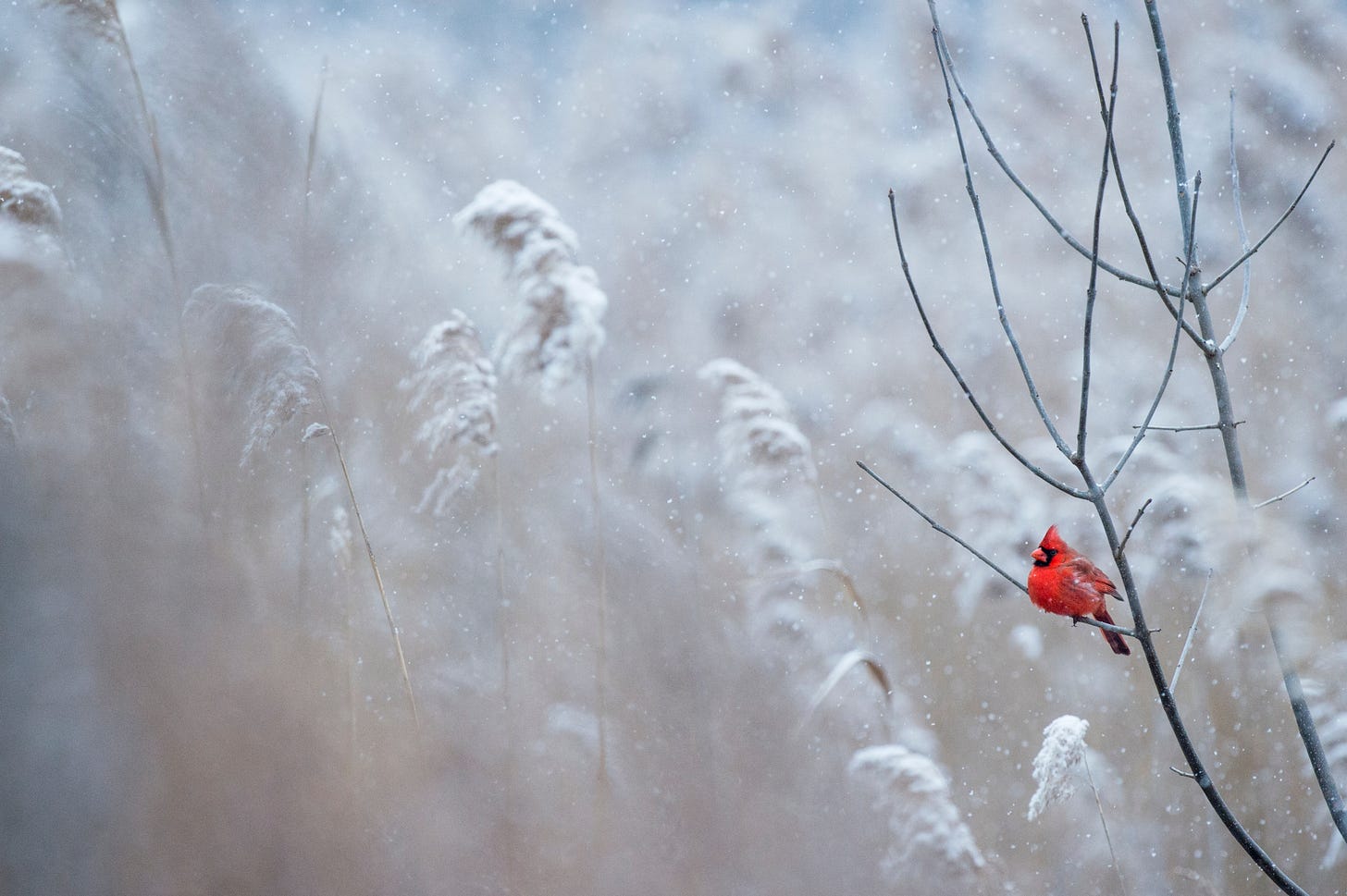Practicing the Presence of God
Lessons on the art of eating Christ

My ten year old says she can hear God. I asked her to explain how she can hear him. She said that she hears him when she cries while reading the Bible. My eyes get all blurry, she says. And I shake on the inside.
I am trying to hear God too. For some reason the act of listening to, well anything really, these days is near impossible.
It's my schedule, that must be it. It's my obligations. Ah, it's my work. I simply don't have time to listen. These excuses flare up and flame out. And I say, hang it all, I'm going outside to walk and to listen.
The Pulitzer Prize-winning author Annie Dillard says the world drones on in a kind of suppressed silence. This silence, she says, is the hum of the world: the bird song, the trees waving in wind, all the things that happen whether I am there to watch or hear them happen. All this is silence because we, mankind, have removed the holiness from it all.
We’ve muted everything that used to be sacred and full of language. She says God used to speak to humans from the thundercloud, but they feared him and sent Moses to the mountain, and so God only talked to Moses and told the Israelites to go into their tents. God stopped talking to us, she says.
I agree we've muted the holy in our world with our self-centered lifestyle, but it is not God who decided to stop talking. It is us.
Learning to Talk Again
As I walk the woods behind our house my thoughts blaze through the excuses once again. I feel so deceived, I think to myself. This is all my doing. I'm pushing God out of the minutes of my day and filling those same moments with empty worry. Are my anxious thoughts really so important?
Have I stopped "practicing the presence of God," to use the Brother Lawrence phrase? And what is that practice?
God is with me, here, as I write. He is with me as I walk the greenway. Why don't I talk to him? Why don't I include him on each happening throughout my day? Why don't I consult with him about this decision or that decision? Why can't I tell him “Thank you” for the barren winter trees?
The insight of Brother Lawrence is helpful here:
That in order to form a habit of conversing with GOD continually, and referring all we do to Him; we must at first apply to Him with some diligence: but that after a little care we should find His love inwardly excite us to it without any difficulty.
So, I can and should and do converse with him but why?
Because his love excites me and draws me to him.
Do you love him enough to talk with him? Do I?
Why is this simple act of talking with God so difficult to put into everyday practice? I find the answer found in the beloved verse: "Seek ye first the kingdom of God ... " And I see that it is a question of desire and trust.
Eating God
As I continue down this path of "spiritual minimalism," I've revisited the discipline of fasting, which I’ve listed as one of the main aspects of spiritual minimalism. To review, “spiritual minimalism” relates to other types of minimalism in that it’s an act of “reducing,” or only using what is needed for a freer more relaxed feel, like when referring to minimalism in your home. Or, in writing poetry, for example, the writer seeks to say a lot with few words.
In spiritual minimalism, it’s about reducing the impact of noise and distraction on your spirit. In order to do this, certain disciplines can and should be used. One such discipline is fasting.
In fasting, a person must fight through the appetite in order to remain focused on the act of pursuing God. Our appetites are trained. They know when we typically eat and they cry out for food. But if a person can push through these hunger pains, they discover that they’re just fine on the other side of them. We’re conditioned to listen to our hunger pains. And in our society, it’s very simple to walk into the kitchen and satisfy that desire.
Pushing past that desire, on the other hand, requires discipline and trust. It requires a person committing to eating God in that moment.
“You are my food at this moment, God. You sustain me. I will eat you instead of food.”
And this eating of God looks like talking to him (generally known as prayer) and also feasting upon his Word.
Finding Joy in Today
I find a parallel in the act of fasting with what Kierkegaard wrote about possessing the strength to live like Christ. If you remember from a couple of newsletters ago, I wrote about a passage from Kierkegaard’s Philosophical Fragments that challenged me to discern whether or not I possessed the “power to go without.”
He observed how Christ had no home, nor gave care to where we would stay the night, he relied upon his Father for his need. Kierkegaard wondered if this was an appropriate way of life for the Christian to emulate. He thought it was, but only if a person possesses the power to live beyond their appetites, their desires.
Fasting is a discipline that requires us to live beyond our appetites. It teaches us to go without and to rely on God to sustain us both spiritually and physically.
Fasting requires me to look to God constantly. To talk to him. To open myself up to him in confession. I’ve wondered out loud here in this newsletter what it might look like to incorporate fasting on a weekly basis. How might the constant seeking first the kingdom of God through the discipline of fasting galvanize my faith? How might it shape me? What might it demand from me?
I told my wife a few weeks ago when I first began contemplating all of this, that I was scared to do it.
"I’m scared of what God might ask me to do,” I told her.
I feel like there’s a door before me with the word “Fasting” carved upon it. I like to look at it, but I’m not always stoked to push the door open and explore what lies behind it.
This week I’ve been reflecting on the passage in Matthew 6 where Jesus preaches to the disciples about seeking first his kingdom and tells them to stop being anxious. He points to the lilies of the field and observes how they don’t toil and yet they are beautifully adorned.
Take a moment and reflect on the passage for yourself. And yes, I’ve used the King James version here because, well, it’s beautiful:
Take no thought for your life, what ye shall eat, or what ye shall drink; nor yet for your body, what ye shall put on. Is not the life more than meat, and the body than raiment?
Behold the fowls of the air: for they sow not, neither do they reap, nor gather into barns; yet your heavenly Father feedeth them. Are ye not much better than they?
Which of you by taking thought can add one cubit unto his stature?
And why take ye thought for raiment? Consider the lilies of the field, how they grow; they toil not, neither do they spin:
And yet I say unto you, That even Solomon in all his glory was not arrayed like one of these.
Wherefore, if God so clothe the grass of the field, which to day is, and to morrow is cast into the oven, shall he not much more clothe you, O ye of little faith?
Therefore take no thought, saying, What shall we eat? or, What shall we drink? or, Wherewithal shall we be clothed?
(For after all these things do the Gentiles seek:) for your heavenly Father knoweth that ye have need of all these things.
But seek ye first the kingdom of God, and his righteousness; and all these things shall be added unto you.
How jolting are Jesus’s words: “Take no thought for your life …”
“But Tim,” you say, “That’s ridiculous. Surely we need to read those words with a modern eye and know that Jesus is not saying we are not to care for anything like food or drink or our homes—doesn’t he want us to have those things and be clothed and well-fed?”
Jesus, certainly, is not saying go sit on a rock and wait for food to come to you. Or is he?
What I find Jesus getting at here is our appetites. He’s challenging our desires for sustenance and saying, “I myself will be your sustenance. Eat me!”
In another discourse, Kierkegaard reflects upon this Matthew passage:
“And such is the case with the lilies and the birds. But their instruction in joy (which their lives in turn express) is quite simply as follows. There is a today. Upon the word ‘is’ there falls an infinite emphasis. There is a today—and again, there is no concern at all for the morrow or for the day after. This is not frivolity on the part of the lilies and the birds, but it is the joy of silence and obedience.
For when thou dost hold they peace in the solemn silence which prevails in nature, the morrow is non-existent; and when thou dost obey as the creatures obey, the morrow is non-existent—that baleful day which is the invention of chattering and disobedience. But when by reason of silence and obedience the morrow is non-existent, today is, it is—and then there is joy, as there is in the lilies and the birds.”
I am pushing beyond the door, my friends. The one upon which the word “Fasting” is carved. And I’m seeking the kingdom. I want to eat Christ and go without. But I fear I am not ready for what that means in totality.
Only, I look to the lilies. And I hear the birds of the air.
And I shout my dissent to Annie Dillard, “Listen to all of creation and to the solemn silence, this drone of life and hear it again for the first time. It is not the silence of despair, the silent absence of God’s voice. No, it is the joy of today as sung by all of creation—by the lilies and the birds. They say, ‘Spin not, oh man! For he has us. He has us all.”
Further Reading
The Sermon on the Mount by Robert Guelich
Christian Discourses by Soren Kierkegaard
Teaching a Stone to Talk by Annie Dillard
Celebration of the Disciplines by Richard Foster
The Gathering
Join us this Thursday night at 8:30 pm to take this discussion into the open air. I’ll send an email out with a question related to our ongoing conversation about spiritual minimalism and leave the floor open up for everyone to learn from each other. The last one was awesome, so I hope you’ll drop in and participate!
New Podcast Episode
Join me for The Saturday Stoke Podcast in which I talk about the beauty and value of the concept of “togtherness.”

Now you can listen to The Stoke on:
Google Play
Stitcher
Spotify

